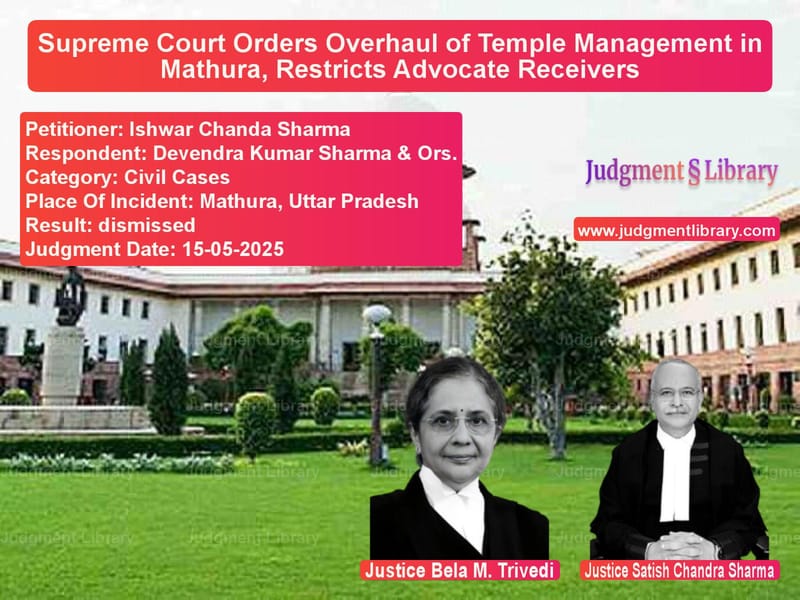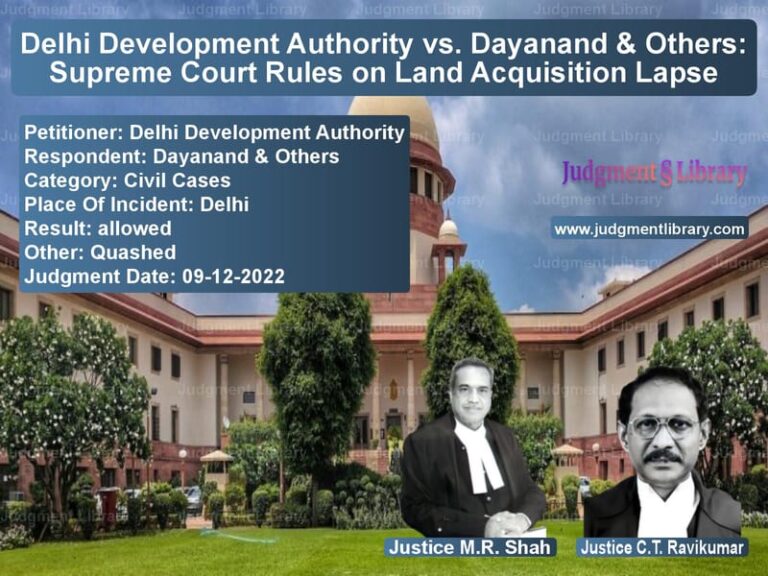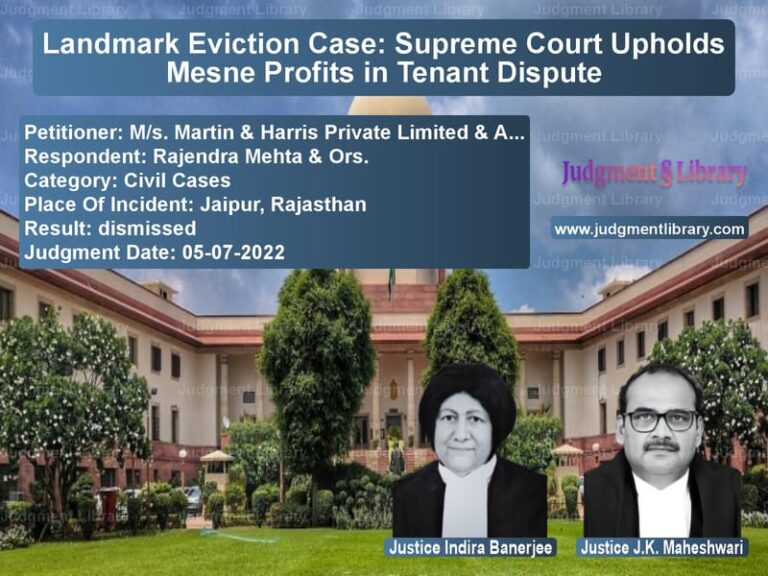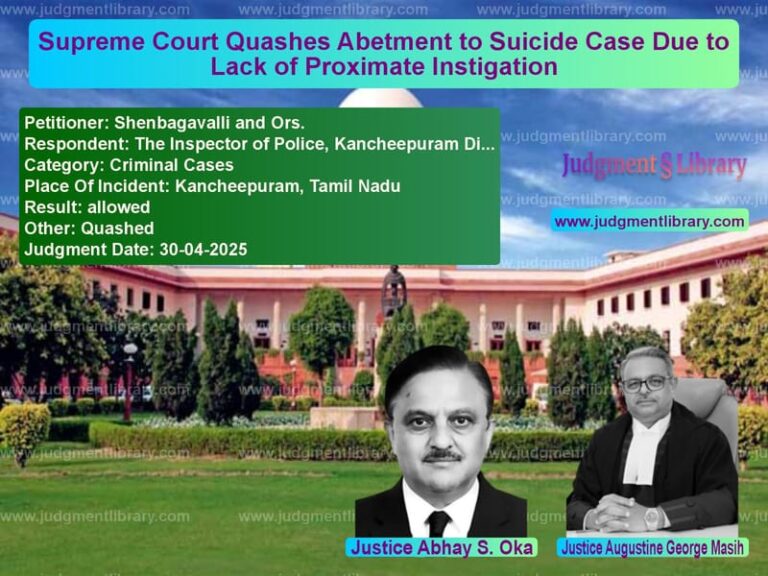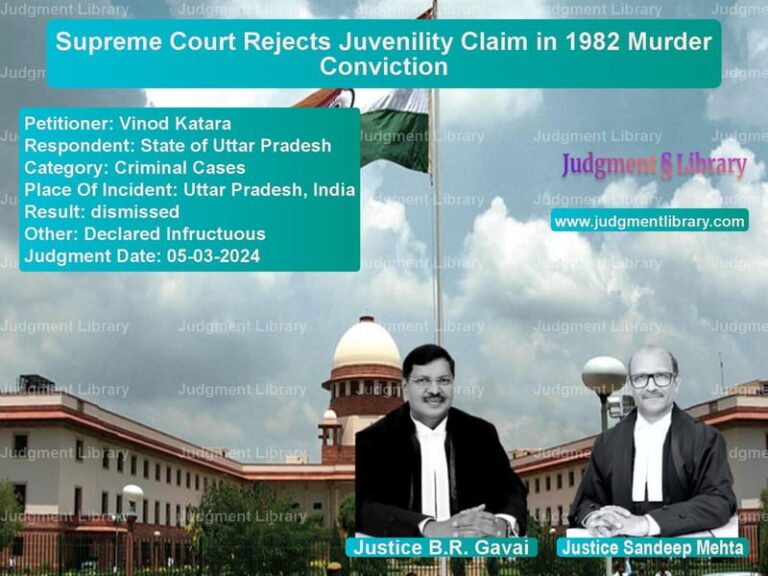Supreme Court Orders Overhaul of Temple Management in Mathura, Restricts Advocate Receivers
The hallowed towns of Mathura and Vrindavan, the land where Lord Krishna is believed to have been born and spent his childhood, are today at the center of a different kind of divine drama—one unfolding in the courtrooms. For decades, numerous ancient temples in this spiritually significant region have been caught in legal battles, with their management controlled by court-appointed Receivers, many of whom are practicing advocates. This practice has now come under severe scrutiny by the Supreme Court of India, leading to a landmark judgment that could reshape temple administration in the Braj region.
The case before the Supreme Court originated from a dispute concerning the Sri Giriraj Temple in Govardhan, Mathura. The core issue was the appointment of a Seven-Member Committee as Receivers for the temple, which included three lawyers. This appointment was challenged before the Allahabad High Court, which strongly criticized the prevailing system of Receivership in Mathura’s temples. The High Court set aside the Trial Court’s order appointing the committee, noting that it frustrated the provisions of Order XL Rule 1 of the Code of Civil Procedure, 1908. It was this order of the High Court that was brought before the Supreme Court by one of the committee members, Ishwar Chandra Sharma.
The Supreme Court, in its judgment delivered by Justices Bela M. Trivedi and Satish Chandra Sharma, did not confine itself to the narrow question of the specific committee’s appointment. Instead, it addressed the systemic malaise affecting temple administration across Mathura. The Court took note of a shocking report from the District Judge of Mathura, which listed 197 civil suits concerning temples in the district, with litigation dating as far back as 1923. The Court observed that many of these famous temples are under the management of Receivers, most of whom are practicing advocates from Mathura.
The High Court had made several scathing observations about this state of affairs, which the Supreme Court reproduced and endorsed. The High Court had stated, “Receivership in the temple town of Mathura has become the new norm. Most of the famous and ancient temples are in the grip of legal battle, restraining the temple trust, its Shebait and the Committee to manage its affairs and are being run by persons appointed by the Court as Receivers.” It further noted, “The interest of Receiver lies in keeping the litigation pending. No effort is made to conclude the civil proceedings, as the entire control of temple administration vest in the hands of Receiver.”
One of the most significant criticisms was against the appointment of advocates as Receivers. The High Court had remarked, “A practising lawyer cannot devote sufficient time for the administration and management of a temple, especially of Vrindavan and Govardhan, which needs skill in the temple management along with full devotion and dedication. It has become a symbol of status in the city of Mathura.” It directed that courts should “make every endeavour to appoint, if necessary, a Receiver who is connected with the management of a temple and has some religious leaning towards the deity. He should also be well versed with the Vedas and Shastras. Advocates and people from district administration should be kept away from the management and control of these ancient temples.”
Before the Supreme Court, the Appellant, Ishwar Chandra Sharma, argued that there is no statutory bar under Order XL of the CPC against appointing advocates as Receivers. He contended that their legal expertise is beneficial for managing complex legal and administrative issues. He also argued that the High Court’s order created an unreasonable classification between individuals with religious knowledge and practicing advocates, violating Article 14 of the Constitution. He stated, “It is baseless to gauge and relate a person’s management competence with his/her beliefs and their ability to understand the religious texts.”
The Respondents, Devendra Kumar Sharma and others, countered these arguments. They emphasized that the very essence of appointing a receiver is to place the temple’s management in the hands of someone well-versed in its traditions. They argued, “A practicing advocate cannot adequately devote time to the administration and management of a religious institution. Given the intricate religious and customary practices associated with the temple, the need for a skilled and knowledgeable caretaker is paramount.” They also pointed out that the Appellant lacked locus standi as the Impugned Order had already been complied with by the Trial Court by appointing a new caretaker.
The State of Uttar Pradesh also intervened in the case, highlighting the dire administrative and safety situation in several temples, particularly the Shri Banke Bihari Temple in Vrindavan. The State apprised the Court that the temple, spread over a mere 1200 sq. ft., sees an average of 50,000 devotees daily, a number that swells to over 5 lakhs on festivals. This congestion led to a tragic stampede in 2022. The State presented a scheme for developing a corridor around the temple by purchasing 5 acres of land, for which it sought permission to utilize the temple’s own funds, which amount to over Rs. 300 crores.
Another intervener, Dilip Kumar Sharma, who claimed to be the duly elected Secretary of the temple management society, argued against the State’s proposal for takeover. He suggested that wherever duly elected management bodies exist, administration should be handed back to them, and in other cases, fresh elections should be conducted.
The Supreme Court, after considering all submissions, delivered a comprehensive judgment addressing both the specific issue of Receivers and the larger problem of temple administration and safety. The Court agreed with the High Court’s observations, noting that the appointment of Receivers was meant to be a temporary, stop-gap measure but had become a permanent feature, prolonging litigation for decades. The Court stated, “It is unfortunate that while appointing Receivers, the concerned Courts are not keeping in mind that Mathura and Vrindavan, the two most sacred places for Vaishnav Sampradayas and, therefore, persons from Vaishnav Sampradayas should be appointed as Receivers.”
Disposing of the appeal, the Supreme Court directed the Trial Court to comply with the High Court’s order and appoint a Receiver “having relevant adequate administrative experience, historical, religious and social background preferably belonging to the Vaishnav Sampradaya.” This directive effectively upholds the High Court’s stance against the routine appointment of advocates as Receivers.
In a significant move exercising its power under Article 142 of the Constitution to do complete justice, the Court also addressed the situation of the Banke Bihari Temple. Modifying the order of the Allahabad High Court in a related PIL, the Supreme Court permitted the State of Uttar Pradesh to utilize the temple’s funds to acquire the 5 acres of land needed for the development corridor. However, it mandated that the land so acquired must be in the name of the Deity/Trust. The State will bear the construction cost of over Rs. 500 crores for developing parking, accommodation, and other amenities for devotees.
This judgment marks a pivotal moment for the governance of India’s ancient religious institutions. By curbing the prolonged control of temples by legal professionals and emphasizing the need for administratively competent and religiously inclined management, the Supreme Court has sought to restore the sanctity and efficient administration of these holy sites. It underscores that the courts’ role is to resolve disputes expediently, not to become permanent administrators through their appointed Receivers, thereby ensuring that the faith of millions of devotees is honored with both devotion and diligence.
Petitioner Name: Ishwar Chanda Sharma.Respondent Name: Devendra Kumar Sharma & Ors..Judgment By: Justice Bela M. Trivedi, Justice Satish Chandra Sharma.Place Of Incident: Mathura, Uttar Pradesh.Judgment Date: 15-05-2025.Result: dismissed.
Don’t miss out on the full details! Download the complete judgment in PDF format below and gain valuable insights instantly!
Download Judgment: ishwar-chanda-sharma-vs-devendra-kumar-sharm-supreme-court-of-india-judgment-dated-15-05-2025.pdf
Directly Download Judgment: Directly download this Judgment
See all petitions in Property Disputes
See all petitions in Consumer Rights
See all petitions in Environmental Cases
See all petitions in Education Related Cases
See all petitions in Reservation Cases
See all petitions in Contempt Of Court cases
See all petitions in Judgment by Bela M. Trivedi
See all petitions in Judgment by Satish Chandra Sharma
See all petitions in dismissed
See all petitions in supreme court of India judgments May 2025
See all petitions in 2025 judgments
See all posts in Civil Cases Category
See all allowed petitions in Civil Cases Category
See all Dismissed petitions in Civil Cases Category
See all partially allowed petitions in Civil Cases Category

